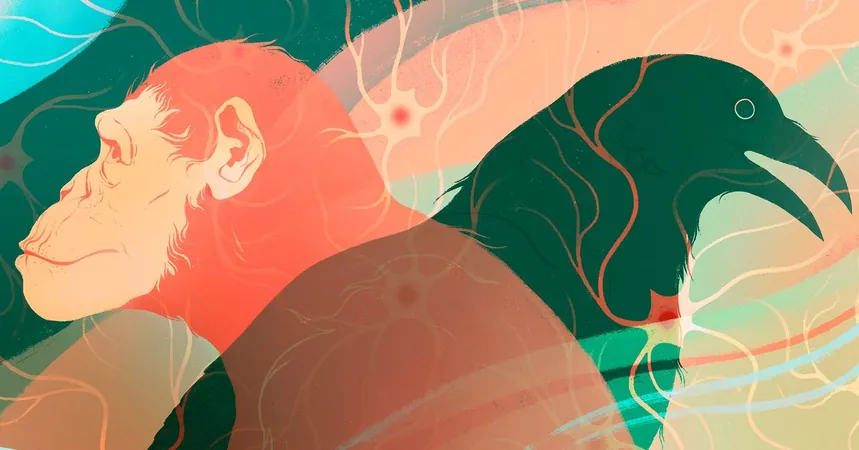
Intelligence Evolved on Earth: A Remarkable Tale of Two Paths
2025-05-11
Author: Wei
The Origins of Intelligence: A Dual Evolutionary Journey
Humans have long viewed their intelligence as the pinnacle of evolution. We excel in mathematics, logic, and abstract thought. However, intelligence is not exclusive to us. Numerous nonhuman species, especially birds, have demonstrated extraordinary cognitive abilities. For instance, ravens exhibit future planning, crows master counting and tool use, and cockatoos deftly navigate booby-trapped garbage bins. Birds are accomplishing these feats with brains that, although smaller and structurally different from ours, reveal a surprising depth of intelligence.
Onur Güntürkün, a brain researcher at Ruhr University Bochum, posed a perplexing question: "How can a 10-gram brain of a bird achieve cognitive tasks comparable to a chimp's 400-gram brain?" This inquiry has fueled an ongoing debate in the scientific community regarding the origins of intelligence in vertebrates—both birds and mammals.
One Ancestor or Two? The Evolutionary Debate
Two leading theories exist about the evolution of vertebrate intelligence: either it arose from a shared ancestor—a lizard-like creature that roamed the Earth 320 million years ago—or it developed independently in birds and mammals. Tracing the evolutionary lineage has proven challenging, as any remnants of the ancient brain have long since eroded. Instead, biologists have resorted to comparing the brain structures of existing species.
Recent research published in 2025, however, provides compelling evidence for the latter theory, suggesting that birds and mammals evolved their intelligence pathways independently. This groundbreaking revelation implies that our capacity for complex thought emerged multiple times throughout evolutionary history.
Beyond Human Supremacy: A New Perspective on Intelligence
In a world fascinated by artificial intelligence, this new understanding of biological intelligence prompts significant reflections. Niklas Kempynck, a graduate researcher leading one of the studies, cautions against the notion that humans hold the supreme title in intelligence. "We are not the ultimate solution to intelligence," he notes. "Birds have succeeded in their own right."
Revisiting Bird Brain Perceptions
For decades, scientists underestimated bird intelligence, believing their brains lacked the neocortex—the part of the brain responsible for higher-order cognitive functions in mammals. With layers of neurons that process sensory information, the neocortex was thought essential for advanced thinking.
However, Harvey Karten from MIT transformed this viewpoint when he discovered that brain regions in birds, like the dorsal ventricular ridge, bore similarities to mammalian circuits. His findings shifted the conversation, suggesting that birds might possess cognitive capabilities previously unacknowledged.
New Evidence from Embracing the Old Debate
In a groundbreaking series of studies, researchers employed single-cell RNA sequencing to investigate brain development in both birds and mammals. This analysis revealed that while avian and mammalian brains may function similarly, they developed their structures through different evolutionary paths.
Two independent research teams confirmed this, showing that the circuits evolved at different developmental stages, reinforcing the idea of independent evolution. They noted, however, that while similar in function, the neural circuits were constructed from different cell types.
The Future: Unraveling the Mysteries of Intelligence
The exploration of intelligence remains a complex journey. There is no manual or definitive path for its evolution. But what is clear is that intelligence can arise independently across different species—whether it be in birds, OCTOPUSES, or even ancient civilizations independently constructing pyramids. Understanding these diverse evolutionary solutions could deepen our comprehension of intelligence as a whole.
With these insights, researchers are now looking to explore not only how intelligence emerged across species but how we might apply these findings to artificial intelligence. As Kempynck suggests, it could be fascinating to examine intelligence from a bird’s perspective. How can such a different cognitive approach shape the future of AI?





 Brasil (PT)
Brasil (PT)
 Canada (EN)
Canada (EN)
 Chile (ES)
Chile (ES)
 Česko (CS)
Česko (CS)
 대한민국 (KO)
대한민국 (KO)
 España (ES)
España (ES)
 France (FR)
France (FR)
 Hong Kong (EN)
Hong Kong (EN)
 Italia (IT)
Italia (IT)
 日本 (JA)
日本 (JA)
 Magyarország (HU)
Magyarország (HU)
 Norge (NO)
Norge (NO)
 Polska (PL)
Polska (PL)
 Schweiz (DE)
Schweiz (DE)
 Singapore (EN)
Singapore (EN)
 Sverige (SV)
Sverige (SV)
 Suomi (FI)
Suomi (FI)
 Türkiye (TR)
Türkiye (TR)
 الإمارات العربية المتحدة (AR)
الإمارات العربية المتحدة (AR)